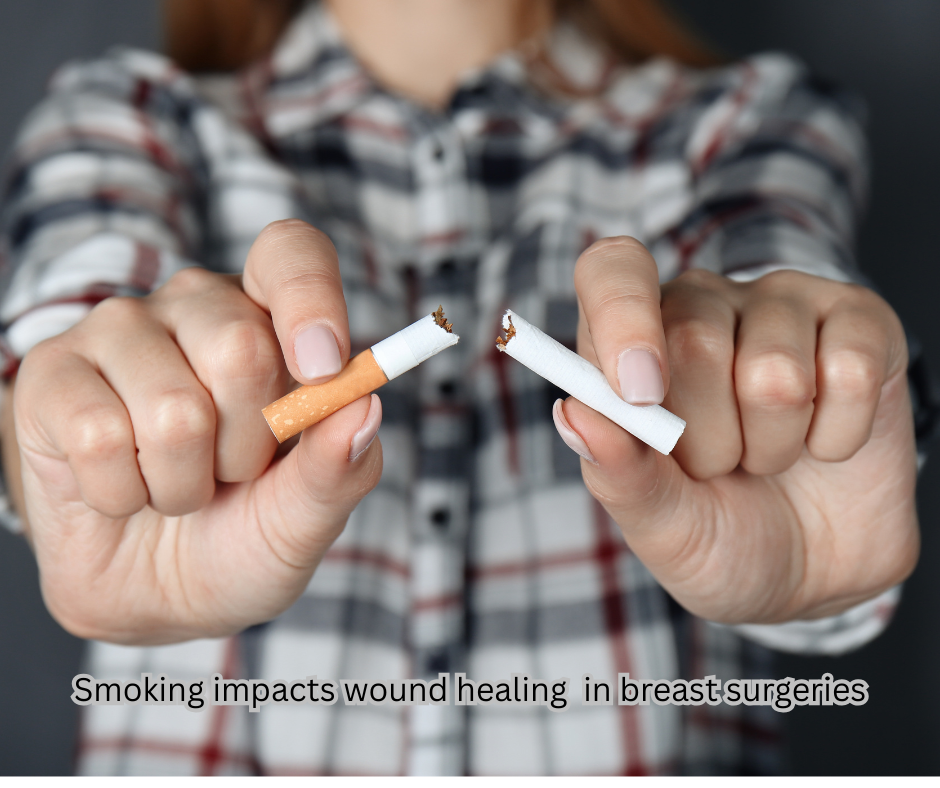Can Cannabis and Tobacco use affect Implant-Based Breast Reconstruction Outcomes

Introduction
Breast reconstruction is a vital component of post-mastectomy care, significantly impacting the psychological and physical well-being of patients. While tobacco use has long been identified as a risk factor for surgical complications, the role of cannabis use remains less understood. A recent study published in the Aesthetic Surgery Journal sheds light on the potential risks associated with cannabis and tobacco use in patients undergoing implant-based breast reconstruction. By analyzing data from two large healthcare databases, the study provides critical insights into how substance use influences surgical outcomes.
Study Overview
The research utilized data from the TriNetX and PearlDiver databases, collectively encompassing over 146,000 patients who underwent implant-based breast reconstruction. Patients were divided into four cohorts: cannabis-only users, tobacco-only users, dual users (both cannabis and tobacco), and non-users. Through logistic regression analysis, the study evaluated the correlation between substance use and postoperative complications such as surgical site infections, wound dehiscence, and the need for additional surgical interventions.
Key Findings
- Increased Risk of Surgical Site Infection: Patients with a history of cannabis use were found to have a 2.18 times higher likelihood of developing surgical site infections compared to non-users. The risk was even higher for tobacco users, at 2.84 times.
- Complications in Dual Users: Those who used both cannabis and tobacco had significantly increased odds of developing complications such as wound dehiscence (5.53x higher risk), surgical site infection (1.72x higher risk), and the need for debridement (2.22x higher risk).
- Tobacco Use and Wound Healing: Consistent with prior research, tobacco use alone was linked to increased risks of wound dehiscence (3.60x higher risk) and need for debridement (1.61x higher risk).
Interpretation and Clinical Implications
The findings indicate that cannabis use is not as benign as commonly perceived in the context of surgery. While the detrimental effects of tobacco on wound healing are well-documented, this study suggests that cannabis use may also impair immune function and increase infection risks. Notably, the combination of both substances appears to exert a synergistic effect, exacerbating complications.
Plastic surgeons should consider these findings when counseling patients about preoperative risk factors. Smoking cessation programs should incorporate discussions about cannabis use, emphasizing its potential impact on surgical outcomes. Future studies are needed to examine how factors such as frequency, dose, and route of cannabis consumption affect postoperative healing.
Table: Key Highlights of the Study
| Factor | Cannabis Only | Tobacco Only | Cannabis & Tobacco |
|---|---|---|---|
| Surgical Site Infection | 2.18x increased risk | 2.84x increased risk | 1.72x increased risk |
| Wound Dehiscence | No significant increase | 3.60x increased risk | 5.53x increased risk |
| Need for Incision & Drainage | No significant increase | No significant increase | 2.39x increased risk |
| Need for Debridement | No significant increase | 1.61x increased risk | 2.22x increased risk |
References
Garoosi, K., Lee, N., Tuano, K. R., Lee, E. L. H., Cohen, J., Winocour, J., Kaoutzanis, C., et al. (2024). “Analysis of Complications in Patients With a History of Cannabis Use and Tobacco Use Undergoing Implant-Based Breast Reconstruction.” Aesthetic Surgery Journal, 44(1), NP41-NP48. https://doi.org/10.1093/asj/sjad296
Conclusion
This study underscores the need for increased awareness of how both cannabis and tobacco use can impact postoperative recovery in breast reconstruction patients. With cannabis legalization expanding globally, it is imperative for surgeons and patients to recognize its potential perioperative risks. Preoperative patient counseling should incorporate discussions about all forms of smoking, ensuring optimal surgical outcomes.
FAQs on Cannabis, Tobacco Use, and Breast Reconstruction Surgery
1. Does cannabis use affect my breast reconstruction surgery recovery?
Yes, studies show that cannabis use increases the risk of surgical site infections, which can delay healing and potentially lead to complications requiring further medical intervention.
2. How does smoking tobacco impact my breast reconstruction results?
Tobacco use significantly impairs wound healing, increases the risk of wound dehiscence (wound reopening), and may lead to surgical site infections, increasing the likelihood of implant failure.
3. If I use both cannabis and tobacco, are my risks higher?
Yes, patients who use both cannabis and tobacco have a 5.53 times higher risk of wound dehiscence and a 2.22 times higher risk of needing debridement (removal of dead tissue).
4. Should I stop using cannabis before my breast reconstruction surgery?
Yes, stopping cannabis use at least four to six weeks before surgery can help reduce the risk of infections and improve overall surgical outcomes.
5. Can vaping cannabis or tobacco still affect my surgery results?
Yes, vaping also introduces harmful chemicals into the bloodstream, affecting oxygen levels and immune function, which can slow healing and increase complications.
6. What are the main complications associated with cannabis and tobacco use in breast reconstruction?
The most common complications include surgical site infections, wound dehiscence, increased risk of incision and drainage, and the need for tissue debridement.
7. Can secondhand cannabis or tobacco smoke affect my healing?
Yes, even secondhand smoke can reduce oxygen delivery to tissues, potentially affecting wound healing and increasing the risk of infection.
8. Are there any alternatives to cannabis for pain management after surgery?
Yes, your surgeon can recommend non-opioid pain relievers, physical therapy, and relaxation techniques as safer alternatives to cannabis for post-surgical pain management.
9. Will my surgeon test me for cannabis or tobacco use before surgery?
Some surgeons may require urine or blood tests to check for nicotine and cannabis use, as it helps them assess the risk of complications.
10. How can I reduce my risks if I have a history of smoking or cannabis use?
To lower risks, consider quitting at least a month before surgery, maintaining good nutrition, staying hydrated, and following all pre- and post-surgical care instructions.
